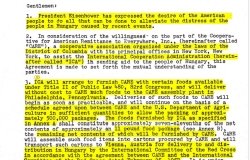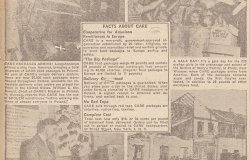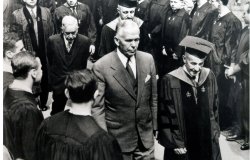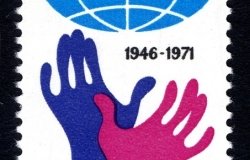Strait Talk: United States-Taiwan Relations and the Crisis With China
Nancy Bernkopf Tucker, Senior Scholar, Woodrow Wilson Center, and Professor of History, Georgetown University; Kenneth G. Lieberthal, Director of the John L. Thornton China Center and Senior Fellow in Foreign Policy and Global Economy and Development at the Brookings Institution.
Overview
Nancy Bernkopf Tucker, Senior Scholar, Woodrow Wilson Center, and Professor of History, Georgetown University, Kenneth G. Lieberthal, Director of the John L. Thornton China Center and Senior Fellow in Foreign Policy and Global Economy and Development at the Brookings Institution
"The Taiwan Straits is the only place in the world where two nuclear powers can still go to war," stated Wilson Center Senior Scholar and Georgetown Professor Nancy Bernkopf Tucker, at a Cold War International History Project discussion of her latest book Strait Talk: United States-Taiwan Relations and the Crisis with China. According to Tucker, a war in the strait could come as a result of misperception or miscalculation, as well as express intent by one side. In her book, Tucker traced the evolution of the U.S. relationship with the Republic of China from the Eisenhower administration and Nixon's normalization with the People's Republic of China into the early 21st Century, highlighting the underlying narrative of mutual mistrust which persisted to this day.
Tucker traced the beginnings the contentious relationship to the May 1957 visit by the U.S. ambassador in the ROC to mainland China, during which he praised the emerging relationship between the People's Republic and the United States. Outraged, people in Taipei took to the streets. This incident, Tucker argued, was a first major expression of Taipei's fear that the U.S. might "sell out" Taiwan. While ready to defend Taiwan, the Eisenhower administration, Tucker argued, in fact secretly readied itself to establish diplomatic relations with the PRC, end the embargo against the communist country, and even allow for admission of the Beijing regime to the U.N.
Taipei's fears were reinforced by the evolving "normalization" of U.S. relations with the People's Republic of China. Succeeding U.S. governments came to see Taiwan largely as a privileged trading partner and a strategic outpost for intelligence and reconnaissance operations. Nationalist leader Chiang Kai-shek, Tucker argued, used the situation to strengthen his authority at home. As a result, the U.S came to be perceived not as an advocate of democratic values but as a traitor to the people of Taiwan.
By 1971, the Nixon administration's rapprochement with the PRC further raised suspicions in Taiwan. The declassified records of the Nixon administration show, Tucker argued, that the U.S. gave away more than necessary in the negotiations with the PRC -- which hurt the integrity of U.S. foreign policy.
Contrary to the conventional wisdom that secrecy was necessary in order to prevent the Taiwanese from derailing the 1978-1979 recognition talks of the Carter administration, Tucker argued that the Taiwanese were well aware of the recognition talks but incapable of stopping them. The reason for the omission of major points from the final draft Taiwan Relations Act (TRA) was not, as commonly believed, sue to the pressure of events, but a result of the fact that relations with Taiwan were considered less important than normalization of relations with Beijing. The TRA, in Tucker's assessment, reflected the fact that the administration saw Taiwan as expendable.
Considering the island a pawn in the struggle against the Soviet Union, Reagan did not re-establish diplomatic relations, as some in Taiwan had expected; on the contrary, he agreed to end nuclear technology sales to Taiwan. As a consequence, cooperation with the island became increasingly difficult.
Tucker concluded that U.S.-Taiwan relations started to improve under President Ma Ying-jeou since May 2008. Western educated and sensitive to the internal political dynamics in both countries, established three firm guidelines for Taiwan's relations with China, known as the three "NOs" – NO unification, NO independence, and NO use of force. Better communication between Taipei and Washington had since resulted in progress towards resolving trade disputes and concluding free trade agreement. There might even be a Cabinet visit next year, Tucker predicted, which would be the first one since the Clinton Administration.
In conclusion Tucker emphasized that despite improved relations between the U.S. and Taiwan, mutual mistrust between the two countries remained. She cautioned the U.S. administration against becoming complacent about what some perceive as a stable position in the Straits.
Kenneth Lieberthal praised Tucker for her detailed and readable assessment of the intricate relations among Taiwan, China, and the U.S. Tucker's exceptional narrative, Lieberthal stated, revealed a play of diplomacy marked by failure to communicate effectively at a time fraught with tensions.
Though wide-ranging and strong on policy and diplomacy, Lieberthal suggested that more attention had to be paid to the influence of corporate interests and military capabilities. In his experience, Lieberthal stated, corporate preferences exerted considerable influence on policy decisions. Lieberthal also argued that it was important to understand the dynamics of U.S.-Taiwan relations from the perspective of the military: its options and positions greatly shaped the choices politicians made on Taiwan.
Drafted by: Mircea Munteanu and Kristina Terzieva
Christian F. Ostermann, Director, History and Public Policy Program
Hosted By

Cold War International History Project
The Cold War International History Project supports the full and prompt release of historical materials by governments on all sides of the Cold War. Through an award winning Digital Archive, the Project allows scholars, journalists, students, and the interested public to reassess the Cold War and its many contemporary legacies. It is part of the Wilson Center's History and Public Policy Program. Read more

History and Public Policy Program
The History and Public Policy Program makes public the primary source record of 20th and 21st century international history from repositories around the world, facilitates scholarship based on those records, and uses these materials to provide context for classroom, public, and policy debates on global affairs. Read more

Indo-Pacific Program
The Indo-Pacific Program promotes policy debate and intellectual discussions on US interests in the Asia-Pacific as well as political, economic, security, and social issues relating to the world’s most populous and economically dynamic region. Read more
Thank you for your interest in this event. Please send any feedback or questions to our Events staff.







